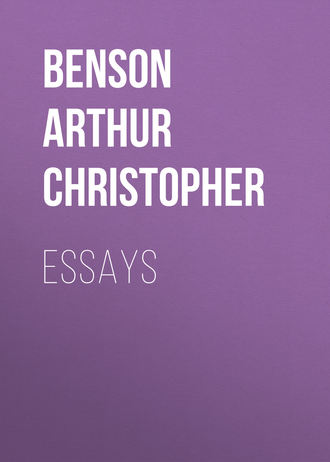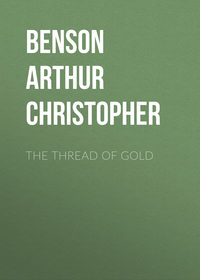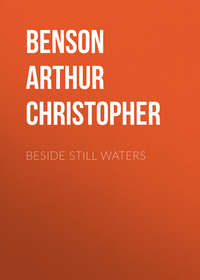 полная версия
полная версияEssays
Mr. Austin Dobson is the soul of exquisite finesse, but the fine, careless rapture he does not claim. Mr. Kipling comes like an explorer laden with strange spoils from an unvisited land, but whether any one may tread in his footsteps is uncertain; it is uncertain, too, whether he has triumphed over or through his environment, and Mr. Gosse has little in common, save his generous admiration, with a poet starred and crowned with gems that all the world before him had conspired to cheapen. Mr. Stevenson, in poetic quality among the greatest, is reticent and will not speak – poignant sincerity is perhaps his most moving characteristic; Mr. Patmore strikes an old, full-flavoured note, in the region of happy homely courtesies – though in the "Unknown Eros" he has once or twice fused the precision of George Herbert with the dignity of Gray. But Mr. Gosse, the Epicurean in the House, would haunt the library rather than the dining-room.
Mr. George Meredith in his gorgeous lyrics strikes the nail too often and too hard, until he dints the panelling. Could he only hold his hand! On any given subject he will breed you a round dozen of stanzas, large and over-ripe, to one more acid berry. Mr. Bridges, the sober, majestic lyrist, with his grave russet effects, his almost stilted dignity, is the one writer, next to the two fixed stars, to whom we are disposed to give unstinted praise for his solemn reticence, his strong, full music; and to him Mr. Gosse must yield the palm in verse; Mr. Bridges has behind him the force of woodland seclusion and the unique devotion of a strong spirit to a slender art, while Mr. Gosse has social claims, artistic and literary criticism, poetical and historical exegesis, and almost unrivalled biographical gifts to drain his spirit. Mr. Watson in his best poetical work is the sublimation of the philosophical critic of poets. For Matthew Arnold, Shelley, Tennyson, Wordsworth, he has done, we think, what Milton did for "Lycidas," and it is impossible to believe that such cool and spacious writing can ever be superseded. Mr. Austin, like Mr. Gosse, is penetrated with Virgil's "inglorious passion for stream and wood." Mr. Aubrey de Vere is the poet of secluded grace, monastic thrills; Lord De Tabley goes to and fro, like Circe, before his stately loom: Mr. Lang is as his own porcelain, foam frozen into crystal. Among younger writers, Mr. Le Gallienne has the elfish voice of a spirit, airy, whimsical, but full of rapturous phrases; Mr. Yeats the eerie wailing of the winds in a haunted Celtic twilight; yet of these two, so essentially spiritual, it is hard to predict anything – like the wind, their prototype, they blow whither and whence they will. But these both are, so to speak, on the tree-tops, while Mr. Gosse treads the earth. Mr. Henley, again, in some of his vehement, rough lyrics, reaches a poignant fervour of which our graceful bard knows nothing. Lastly, among the undoubted chiefs of song, must be mentioned Miss Rossetti, with whose tender, remorseful, almost conventual outlook Mr. Gosse has no common fibre. No greater contrast could indeed be devised, for Miss Rossetti is at heart a dévote and Mr. Gosse a pagan.
It is hard to speak of Mr. Gosse only as a poet without reference to his prose writings, where, indeed, he displays even a more subtle mastery of his art. But we should characterise him as a delicate, impassioned singer of some of the sweetest moods of life. In the fiercer and darker regions of the soul he does not love to linger; in his passion he is, so to speak, anchored safely to life – he is not whirled away in the eddies of elemental seas, with the wild energy that we see, for instance, in Charlotte Brontë's work. In the utmost abandonment of love or sorrow he is conscious of the red moon in the poplar, and the subtle scent of briar and honeysuckle; his feet are on the earth, and almost the deepest pang that he feels is when his jaded senses refuse to respond to the thrill that earth and sky are wont to awaken in him. With man in the abstract he has little sympathy; in the individual the keenest and most intimate delight. He is not the poet of movements; he has no wish to transcribe in verse the economical solutions of poverty. And, lastly, he resolutely lives in a region of sensuous, though pure, delight; he turns aside into the glade when the tainted air warns him that he is near some difficult horror on which he would not gaze. He has none of the impulse of the philosophers to see life steadily and see it whole, and if there is any note of timidity in the poems, we should ascribe it to the author having shunned, or rather missed, the descent into hell which we are inclined to believe necessary for the highest artistic development. Each poet, each man, has his own hell, in which some brief sojourn is necessary if he is to test the seriousness of life and art. Mr. Gosse gives us no hint that this article is included in his creed; we cannot wish that he should be forced to include it, but we say that it is the conscious lack of this experience alone which has kept him from laying claim to the highest glories of song. Delicacy rather than intensity, that is the keynote of his lyrics.
In an exquisite epistle lately addressed by Mr. Austin Dobson to Mr. Gosse, he speaks of himself and his friend as moving in the procession of art "where is not first nor last." "At least," he claims, "we have handed on the fire." We dare not expect all things from each man; but to have made some exquisite mood your own, and to have presented it with passionate accuracy, is no light achievement.
1894.
EPILOGUE
LITERATURE, so long as it be idealistic, is the anodyne of the spirit, the mother of faith, the nurse of hope! Literature records and criticises, but does not make history: as we grow older we have to recognise, slowly and sadly, the fact that the world is profoundly incomplete. The more that we can keep our eyes from a vain attempt to plumb the abyss, the more useful, practical, hopeful we become. And literature, like society, athletics, politics, is one of the devices we resort to, to hide from ourselves the horror of the gap. But the only true consolation is our faith in the incompleteness of the world as we see it, and in the ultimate completeness of the Divine plan. Realistic literature can never help us to this faith: it can only plunge us deeper in the mire – deeper in fact than we need be plunged, because realism deludes us into accepting as typical what is only abnormal.
The Realist is a man who stands beside a drag-net that is being slowly hauled ashore. He picks up and handles, not without a sickly creep of horror, the viscous fleshy things, clammy polypi, bulging, translucent cucumber-objects smelling of the peevish brine. They are struggling, heaving, dying; on them, on these creatures of the silent, moving sea, settles the nauseating faintness of the unsubstantial air. Such pleasure as they give him is horrible, physiological, almost obscene.
But the Idealist, to use an exquisite simile of Mr. Henry James' in "The Middle Years," is the man who visits "the great glazed tank of art." There in the vivarium, through the glimmering panes, under the loops and lines of light, and among the bursting bubbles, on the dim sand, in dusky corners, on jutting shelves of the rock, the strange sea-monsters, all humps and horns, lie at their ease. Strange they are and horrible; but it is a cleanly, a spectacular horror. They are quiet, they are at home. They twiddle their mandibles, they rise and walk, with clumsy groping motions. But there is no vile invasion: they are safe behind the crystal wall.
It is thus that I have tried to show my own gallery of persons. I have not burrowed into their secrets, or tried to nose out scandals. Beyond their studies I have not followed them. There has been none of that "ripping up, like pigs," which Lord Tennyson so forcibly deprecated. I have tried to respect the reticences of these persons, their concealments, their caprices. They are not sliced into sections and bottled, but sketched with what would fain be a careful and affectionate hand.
We can never see too much of desirable people. Though my heroes did not all deal with life in a sharp, business-like way, making the most of its pleasures, and shirking its pains, yet they lived and wrote with dignity.
Dignity! That is the saving quality! No matter how mean the surroundings, how squalid the furniture of life, dignity is always possible, always desirable. Victor Hugo's old rag-picker, cataloguing the horrors she disinterred, with her plate, her pot, her basket, respected herself and her calling, and thought her disposition of scraps worthy of interested description.
Only, our dignity must not be a mere mask; it must not be studied for itself; it must not be a robe sedulously arranged over a skeleton; but it must be the outer radiance of truth and hope and courage. For of all fates the most deplorable is, as the wise Greek said, to be opened and found empty.
1
The name seems to have been spelt quite indifferently, Earl, Earle, or Earles. John Earles' father was Registrar of the Archbishop's Court at York; John Earles seems to have matriculated at Christ Church, on June 4, 1619. But, according to Wood's Fasti, he took his B.A. degree on July 8, 1619, at Merton, and obtained a Fellowship there in the same year.



